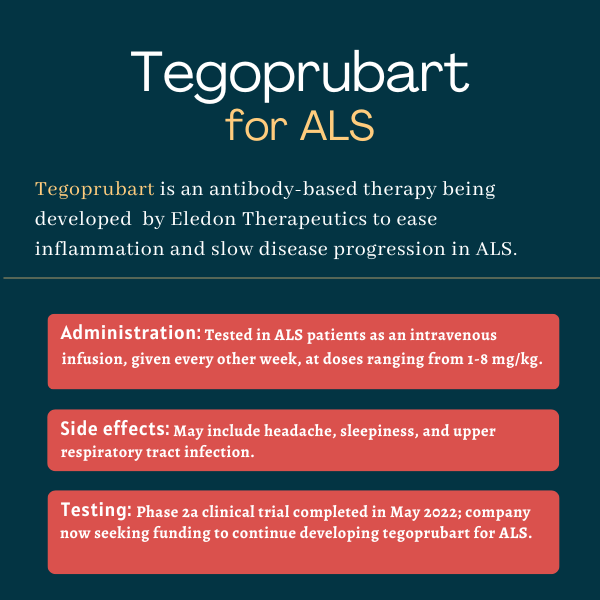
Tegoprubart for ALS
What is tegoprubart for ALS?
Tegoprubart (formerly known as AT-1501) is an investigational antibody-based therapy that’s now in clinical trials for the treatment of amyotrophic lateral sclerosis (ALS). It’s designed to slow disease onset and progression in ALS.
Administered via an intravenous or into-the-vein infusion, the treatment candidate has been granted orphan drug designation by the U.S. Food and Drug Administration. That status provides a number of incentives intended to speed development and regulatory review.
Tegoprubart was discovered by the ALS Therapy Development Institute (ALS TDI), which formed a spin-off company to continue developing the therapy. That company was acquired in 2020 by Eledon Pharmaceuticals, which is now seeking funding to continue advancing tegoprubart in ALS.
Eledon also is investigating tegoprubart as a treatment for organ transplant recipients.
Therapy snapshot
| Treatment name: | Tegoprubart |
| Administration: | Being tested in ALS as an intravenous infusion formulation |
| Clinical testing: | Completed a Phase 2a trial |
How does tegoprubart work in ALS?
Inflammation is believed to be a major disease driver in ALS, contributing to the progressive dysfunction and death of motor neurons — nerve cells involved in motor movement — that marks the disease.
Tegoprubart is a man-made antibody designed to suppress neuroinflammation by preventing the interaction of two molecules at the surface of several types of immune cells. It specifically works by targeting the CD40 ligand (CD40L) protein, whose binding to the CD40 receptor on immune cells is known to boost pro-inflammatory responses, including those leading to autoimmunity and inflammatory nerve damage.
In ALS, the CD40-CD40L signaling between immune cells is higher than normal in more than half of patients, and levels of CD40L in circulation have been linked to the rate of disease progression. By blocking CD40L, tegoprubart promotes a shift in immune T-cells from a pro-inflammatory status to a more immunosuppressive role that dampens immune responses. That is expected to slow ALS progression and improve patient outcomes.
How will tegoprubart be administered in ALS?
Tegoprubart is given via an intravenous infusion. In a Phase 2a clinical trial, it was administered at doses ranging from 1-8 mg/kg given every other week, but higher doses (4 and 8 mg/kg) were generally more effective at targeting CD40L. Further testing will be needed to ascertain a final recommended dose for the therapy.
Tegoprubart in ALS clinical trials
In earlier preclinical studies, a mouse antibody similar to tegoprubart reduced neuroinflammation and improved motor neuron survival in a mouse model of ALS, resulting in delayed disease progression and extended survival.
The findings supported the launch of a Phase 1 clinical trial that tested the therapy in 28 healthy volunteers, as well as four adults with ALS. The participants were given a single infusion of tegoprubart — at doses of 0.5, 1, 2, 4, or 8 mg/kg — or a placebo, and were followed for about 1.5 months.
All doses were deemed safe and well tolerated in both healthy people and ALS patients. The rates of side effects were similar between the tegroprubart and placebo groups, and all were mild in severity. The therapy also showed favorable pharmacokinetics — a medication’s movement into, through, and out of the body — and few patients developed an immune response against the antibody that could potentially render it less effective.
Phase 2a clinical trial
After the promising Phase 1 trial findings, a Phase 2a study (NCT04322149) was launched to evaluate the safety and tolerability of repeat administrations of tegoprubart.
A total of 54 adults diagnosed with ALS in the previous two years were enrolled at sites in the U.S. and Canada. Each was given one of four ascending doses of the therapy, administered in a total of six infusions, given every other week for 12 weeks, or about three months.
Top-line results showed that tegoprubart was generally safe and well tolerated at all doses, with no patients reporting serious or severe treatment-related side effects. Antibodies against tegoprubart, detected in about 4% of samples, did not affect therapy levels.
The two higher doses showed significant CD40L target engagement — as determined by significant reductions in levels of both CD40L and CXCL13, biomarkers of immune T- and B-cell function. These doses also resulted in significant reductions in up to 23 of 32 inflammatory biomarkers, meeting the trial’s secondary goals.
An exploratory goal of the Phase 2 trial was to assess if the therapy slowed the rate of disease progression, as measured with the ALS Functional Rating System-Revised (ALSFRS-R) scale. But because the trial lacked a placebo group, participants were compared with a group of placebo-treated patients from the PRO-ACT database, the largest U.S. clinical database of previous ALS trials.
Data showed that patients with a positive target engagement, defined as at least a 10% drop in CXCL13 levels, had a 19% slower monthly decline in ALSFRS-R scores compared with people from PRO-ACT. Similar results were observed in high responders — those with at least a 10% drop reduction in 75% or more of inflammatory biomarkers — whose disease progressed about 28% slower as compared with controls.
In both groups, the slowing in disease progression was observed across all doses, although higher doses tended to delay disease progression more effectively.

Common side effects of tegoprubart
To date, no treatment-related serious or severe side effects have been reported in ALS clinical trials of tegoprubart. The most common side effects in a Phase 1 trial were headache, sleepiness, and upper respiratory tract infection, but rates were similar with tegoprubart or a placebo.
ALS News Today is strictly a news and information website about the disease. It does not provide medical advice, diagnosis, or treatment. This content is not intended to be a substitute for professional medical advice, diagnosis, or treatment. Always seek the advice of your physician or other qualified health provider with any questions you may have regarding a medical condition. Never disregard professional medical advice or delay in seeking it because of something you have read on this website.
Recent Posts
- AB Science adds new biomarker to Phase 3 masitinib ALS clinical trial
- ‘Early birds’ have significantly lower ALS risk than ‘night owls’: Study
- As my late husband’s ALS progressed, we kept our bucket list simple
- Tossing and turning over fears this ALS journey has come to its end
- Experimental ALS therapy QRL-201 shows potential to slow disease decline
Related articles
 Fact-checked by
Fact-checked by 



